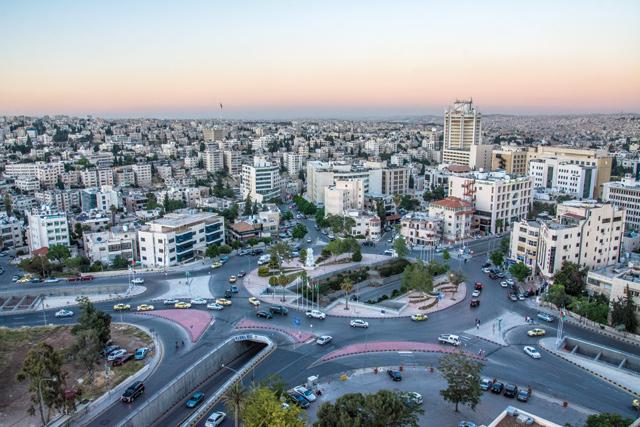You are here
IMF official commends gov’t’s ‘momentum’ on reforms
By JT - Feb 08,2021 - Last updated at Feb 08,2021

Despite a challenging situation brought on by the coronavirus pandemic, the government has achieved progress on key reforms, according to International Monetary Fund Resident Representative to Jordan Kareem Ismail (File photo)
AMMAN — Despite a challenging situation brought on by the coronavirus pandemic, the government has achieved progress on key reforms, notably in governance, tackling tax evasion and enhancing the transparency of public spending, International Monetary Fund (IMF) Resident Representative to Jordan Kareem Ismail said.
In an interview with The Jordan Times, Ismail said that the IMF-supported programme, which was approved in March 2020, “will continue to provide space and flexibility to the government to deal with the pandemic and mitigate its human and economic impact”.
The following is the text of the interview:
Q: 2020 was a tough year for Jordan amid a surge in coronavirus cases, decline in revenues and inability to proceed with reforms as requested, and the IMF agreed on some adjustments to the programme in 2020. Is the year 2021 the year of reforms? Do you believe there is a room for delaying reforms in 2021 or it is the year when Jordan needs to proceed as planned?
A: COVID-19 hit Jordan hard in 2020, like many other countries in the world, disrupting policies and programmes developed before the crisis. With limited policy buffers, the Jordanian government had to face the difficult challenge of containing the pandemic and saving lives on the one hand, and mitigating the economic fallout and saving livelihoods on the other. Resource constraints also meant that the Jordanian authorities had to prioritise the health crisis; this made some delays in reform implementation unavoidable. Against this backdrop, the IMF-supported programme with Jordan [which was approved in March 2020] was re-calibrated to provide the government more space to undertake spending in support of the economy, and to rephase some of the reforms.
Looking to 2021, the programme will continue to provide space and flexibility to the government to deal with the pandemic and mitigate its human and economic impact. This is an immediate priority. At the same time, the programme is designed to preserve macroeconomic stability and advance growth-friendly reforms that will enhance fiscal space for social protection and public investment, boost business competitiveness, improve governance and support durable job creation.
Q: What is your take on Jordan’s progress in 2020 and the outlook for 2021?
A: In 2020, the pandemic weighed on growth, jobs, the current account and public finances. Government policies to support affected sectors, employment, protect the most vulnerable and increase health spending, together with liquidity provision by the central bank, played a crucial role in mitigating the impact of the pandemic. Moreover, despite the challenging situation, the government achieved progress on a number of key reforms, in particular: Strengthening efforts to tackle tax evasion through structural reforms in the Income and Sales Tax Department; progressing on anti-corruption and governance reforms such as the amendments to the illicit gains law and enhancing the transparency of public spending particularly on COVID-19. The combination of timely and targeted policy support and continued commitment to reform enabled the Jordanian government to maintain robust access to domestic and international financial markets. This, in turn, limited the need for large government borrowing from the domestic banking system, enabling the latter to continue lending to the private sector.
While there is considerable uncertainty around the course of the pandemic, which will affect the economic forecast, our current estimates are as follows:
— Economic activity is expected to have contracted in 2020 by 3 per cent. Output is projected to increase by about 2.5 per cent in 2021, as the pandemic abates.
— The current account deficit is expected to have increased to about 7 per cent of GDP in 2020 due to a reduction in exports, tourism receipts and remittances and is projected to stay at this level in 2021.
— Public finances came under pressure in 2020, as revenues fell with the COVID-related slump in economic activity; and spending needs on healthcare, social protection and security rose. Consequently, the central government primary deficit [excluding grants] is expected at around 6 per cent of GDP in 2020; and 3.7 per cent of GDP in 2021, consistent with the budget recently submitted to Parliament.
Q: What are the key focus areas for reforms in 2021, and what are the top priorities to be able to meet the programme’s targets?
A: We continue to emphasise that the immediate priority is to meet critical health and social protection needs to help save lives and livelihoods. Fiscal and monetary policies have provided significant support to the economy thus far and continued targeted support in order to limit the rise of unemployment, and to minimise long-term damage to the economy will be important. In order to support these efforts, the built-in flexibility in the programme to accommodate COVID-19 related spending has been enhanced.
At the same time, ensuring macroeconomic stability and debt sustainability will be paramount. To this end, the government plans to continue its efforts to broaden the tax base and better target and streamline current spending to gradually reduce public debt, while at the same time creating space to durably support the most vulnerable and accommodate the significant public investment needs.
In addition, broader reforms are under way to reduce obstacles to formal employment, through better provision of vocational training [for the youth] and affordable childcare [for women]; improve the business environment by reducing the regulatory burden of licensing requirements; and improving governance and transparency through digitising public procurement and publishing information on COVID-19 spending. Reforms are also critical in the electricity sector, where pressures have increased in the aftermath of the pandemic.
Q: Reforms in the energy sector and ensuring an efficient and fair distribution of electricity subsidies are some of the main reforms under the programme. What is the plan for reforms in this regard in 2021 and what is the time frame for implementation? How will the reform protect the vulnerable?
A: The government has been implementing a range of reforms to improve the finances and efficiency of the electricity sector. These include measures to raise revenues, such as export contracts with Iraq and the West Bank; and reduce costs, including by optimising National Electric Power Company debt and power purchase agreements (PPAs). As part of these reforms, the government also plans to better target electricity subsidies through improving the tariff structure.
Electricity subsidies tend to disproportionately benefit the better off households. This is because they, on average, consume far more electricity than poor households. Subsidies can also result in large public sector deficits, which increases public debt, and limits the government’s ability to fund other priority spending, including on public investment. In sum, there is a clear economic case to reduce subsidies to the rich.
In the case of Jordan, there is also an additional distortion to address: Electricity subsidies to households are paid for by charging high tariffs on businesses. This reduces business competitiveness and hinders job creation.
Thus, a multi-year tariff reform that can address these two distortions and thereby boost competitiveness and help create jobs is a key element of the programme.
Q: What is the plan for water sector reforms, which is one of the sectors contributing to Jordan’s high public debt? Will this be addressed this year or throughout the programme, and what is the plan in this regard?
A: Jordan is one of the driest countries on Earth, and its water resources are already being stressed by climate change. The water sector is vital to the prospects for long-term growth and that is why the government is fully committed to design reforms that will contain rising losses and ensure a sustainable supply of water.
The focus of the IMF-supported programme has thus far been on fiscal structural, electricity and growth-enhancing reforms. That said, it is important to prioritise measures to contain the costs of the water sector [including electricity costs and losses of water in the system]. We understand that the government is preparing a water sector financial sustainability roadmap, which will also leverage support from other development partners.
Q: Debt reduction targets have been revised. What are the targets for 2021 through 2025, and what is your advice to Jordan in this regard to be able to achieve the targets?
A: Public debt levels have risen across the fund’s membership as a result of the COVID-19 pandemic, and Jordan is no exception. Public debt at end-2020 is around 90 per cent of GDP, almost 10 per cent of GDP higher than we expected pre-COVID. Clearly, this debt will have to be reduced over the coming years to preserve debt sustainability and market access. In this regard, a key issue is how to calibrate the fiscal path so it supports the recovery while gradually reducing public debt.
The government has decided to target a reduction in public debt to 80 per cent of GDP by 2025, which we view as appropriate. In this context, reforms to broaden the tax base, including by tackling tax avoidance and tax evasion, will be key to achieving this outcome together with enhancing the efficiency of public spending. Pro-growth structural reforms to boost investment and strengthen labour markets will also support economic activity, which will further strengthen public debt sustainability.
Q: At the legislative level, what are the key areas that need to be addressed, what are the main issues and loopholes that you believe should be taken into account to help Jordan enhance its revenues and meet the programme’s targets?
A: Jordan’s tax code is overly complex and includes several tax loopholes that enable some companies to take advantage through transfer pricing, profit shifting and access to preferential rates. This has been very costly for Jordan as it has led to significant forgone revenues in the past (some studies estimate the losses at nearly 10 per cent of GDP). The erosion of public revenues has been one of the main drivers of public debt accumulation in Jordan. At the same time, these tax exemptions have not seemed to deliver the growth and employment generating benefits they were expected to.
We are encouraged by the government’s momentum on legislative reforms aimed at addressing these loopholes, including the recent amendments to the investment law, which aim to streamline the tax code, rein in tax expenditures, and increase their transparency; and the economic substance regulations which aims to ensure that preferential tax treatments in development and economic zones can only be tapped by the true intended beneficiaries.
These and other in-train legislative tax reforms are key to helping mobilise the revenue needed to create space for public investment and social spending, and reducing public debt in a way that is equitable, growth friendly, and does not involve raising tax rates. These reforms are being supplemented by serious efforts to strengthen the capacity of the tax and customs administrations, and to support digitisation.
Q: What role do you envision for the donor community and international partners in Jordan during the next phase?
A: Jordan’s funding and capacity building needs have increased due to COVID-19. The IMF responded quickly by disbursing $400 million under the Rapid Financing Instrument in May to help Jordan finance urgent needs, stemming from the crisis, which together with disbursement under the Extended Fund Facility brought total disbursements for the year to $689 million. At the same time, the IMF has brought forward into 2021 and 2022, some of the planned disbursements in the outer years of the programme, to help Jordan’s efforts towards a robust post-COVID recovery.
Similarly, the donor community has been instrumental on both the financing and capacity building fronts. It will be critical that donor funding steps up if the post-COVID recovery turns out to be slower than expected. Moreover, donor support is also crucial to help Jordan address the challenges from continuing to host nearly 1.3 million Syrian refugees. Finally, donor efforts to help Jordan exit the COVID crisis through supporting the government’s efforts on vaccination would also be key. In this regard, we commend Jordan’s efforts on vaccination including the equitable treatment of refugees.
Related Articles
AMMAN — An International Monetary Fund (IMF) team is proposing to bring forward into 2021 a part of IMF credit that was expected to be disbu
AMMAN — An International Monetary Fund (IMF) team led by S.
AMMAN — An International Monetary Fund (IMF) team led by S.

















